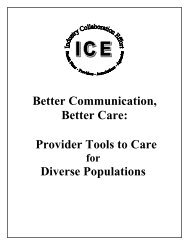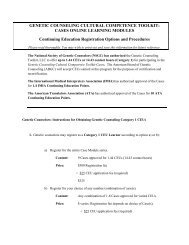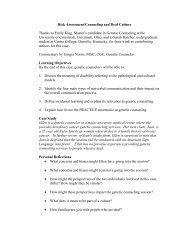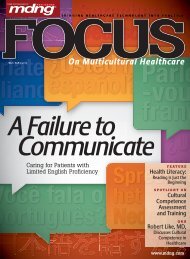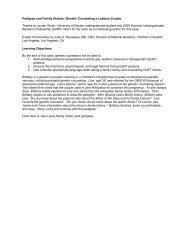Advanced Effective Communication, Cultural Competence, and ...
Advanced Effective Communication, Cultural Competence, and ...
Advanced Effective Communication, Cultural Competence, and ...
You also want an ePaper? Increase the reach of your titles
YUMPU automatically turns print PDFs into web optimized ePapers that Google loves.
A Roadmap for Hospitals<br />
Appendix D: Laws <strong>and</strong> Regulations<br />
• Catskill Regional Medical Center (CRMC). The complainant,<br />
who is deaf, reported that staff failed to provide<br />
her with a sign language interpreter on several occasions at<br />
CRMC, a 162-bed hospital serving 56,000 patients each<br />
year in Sullivan County, New York which has an emergency<br />
response helicopter <strong>and</strong> a trauma center. After a<br />
subsequent investigation by the Office for Civil Rights,<br />
CRMC signed an OCR Resolution Agreement to resolve<br />
the matter <strong>and</strong> agreed to do the following:<br />
— Prohibit surcharges on auxiliary aids <strong>and</strong> services, including<br />
sign language interpreters, video interpretation<br />
services, note takers, assistive listening devices, <strong>and</strong><br />
computer-assisted real-time transcription<br />
— Affirm its compliance with Section 504 of the Rehabilitation<br />
Act of 1973<br />
— Designate a Section 504 Coordinator <strong>and</strong> develop a<br />
Section 504 grievance procedure<br />
— Issue <strong>and</strong> post revised policies to make sure it provides<br />
appropriate auxiliary aids, including sign language interpreters<br />
or video interpretation services, to deaf or<br />
hard of hearing patients or companions within set time<br />
periods<br />
— develop procedures to assess the sign language interpreter<br />
needs of patients or companions<br />
— Train CRMC personnel on its revised policies <strong>and</strong> procedures<br />
to ensure effective communication<br />
— Provide regular compliance reports to the Office for<br />
Civil Rights.<br />
• Florida Department of Children <strong>and</strong> Families (DCF). In<br />
its complaint investigation, the Office for Civil Rights<br />
found that the state violated Section 504 of the Rehabilitation<br />
Act of 1973 <strong>and</strong> Title II of the ADA when it failed<br />
to provide interpreters to deaf persons in critical situations,<br />
such as during child protective services investigations<br />
<strong>and</strong> during treatment in state mental health facilities.<br />
Under the agreement, Florida DCF will make a wide spectrum<br />
of health <strong>and</strong> human services programs available to<br />
an estimated total state population of 3 million deaf or<br />
hard of hearing residents. The agreement requires the state<br />
to take a number of unique (<strong>and</strong> potentially costly) corrective<br />
actions, including the following:<br />
— Hiring an independent consultant to oversee implementation<br />
of the settlement’s terms<br />
— Convening an advisory committee in partnership with<br />
the Florida Coordinating Council for the Deaf <strong>and</strong><br />
Hard of Hearing<br />
— Undertaking a comprehensive self-assessment that requires<br />
surveys of staff <strong>and</strong> of disability advocacy organizations<br />
regarding gaps in service experienced by deaf<br />
<strong>and</strong> hard-of-hearing individuals<br />
— Establishing an interpreter quality assessment <strong>and</strong> certification<br />
program<br />
Under some circumstances, the federal agencies’ agreements<br />
<strong>and</strong> decrees have provided for compensatory damages for the<br />
lack of an interpreter or other aid for a patient’s family members<br />
who are deaf or hard of hearing. In 2003, the DOJ filed a<br />
lawsuit in 2003 against Parkway Hospital, a private hospital<br />
in Queens, New York, for allegedly failing to provide a qualified<br />
sign language interpreter for an elderly deaf patient or her<br />
deaf husb<strong>and</strong> during the woman’s extended hospitalization. In<br />
addition, DOJ alleged the hospital violated the ADA by imposing<br />
communication responsibilities on the couple’s grown<br />
children, who were expected to act as conduits for information<br />
between the family <strong>and</strong> hospital staff. Because of these<br />
failures, the patient’s husb<strong>and</strong> allegedly was unable to obtain<br />
complete information about his wife’s medical diagnosis,<br />
treatment, <strong>and</strong> prognosis. Under the ruling in United States v.<br />
Parkway Hospital, Inc. [8], the hospital was required to pay<br />
$125,000 in compensatory damages to the family <strong>and</strong> to<br />
adopt sign language interpreting policies <strong>and</strong> procedures intended<br />
to ensure effective communication for deaf patients<br />
<strong>and</strong> their family members [9].<br />
Settlements have also addressed st<strong>and</strong>ards for video interpreting<br />
services. Enhanced <strong>and</strong> emerging technologies may allow<br />
health care providers to obtain qualified interpreters more<br />
quickly, economically, <strong>and</strong> efficiently 24 hours a day. Video<br />
interpreting services allow a qualified sign language interpreter<br />
to appear via video from a remote location on a television-like<br />
screen. A hospital opting for this approach must<br />
ensure that the appropriate hardware <strong>and</strong> software are in place<br />
to support the system <strong>and</strong> that staff underst<strong>and</strong> how to operate<br />
<strong>and</strong> maintain the equipment [9]. If a hospital purports to<br />
utilize video interpreting services but does not provide the<br />
necessary administrative <strong>and</strong> operational support to make the<br />
system work, a patient with a hearing disability is denied his<br />
or her right to fully participate in health care decisions <strong>and</strong><br />
family members are shut out from communicating with the<br />
hospital about their loved one.<br />
In 2006, the DOJ intervened in a private lawsuit brought by<br />
seven deaf individuals against Laurel Regional Hospital alleging<br />
a failure to provide either in the emergency department or<br />
71




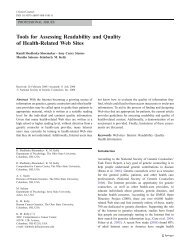

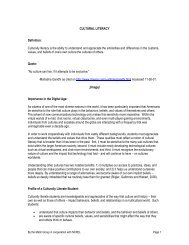
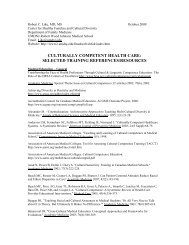

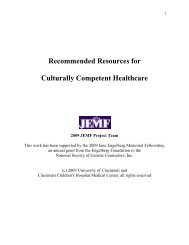

![Breaking Bad News PPT[1] - Genetic Counseling Cultural ...](https://img.yumpu.com/35003134/1/190x146/breaking-bad-news-ppt1-genetic-counseling-cultural-.jpg?quality=85)
